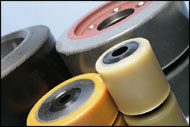 According to the Health and Safety Executive (HSE) there were over 2000 reported accidents involving forklift trucks last year. Of these nearly 30% resulted in major injuries including amputations, broken bones and eight fatalities. While the rate of overall fatalities in the workplace has been in long term decline, there has been no significant change in the last 5 years and in 2006/07 the rate actually increased. Why? Well, there are many possible reasons, chance being one of them, but for people working in your warehouse there is also the growing pressures to improve warehouse efficiency, the increasing demands from large scale warehouses and the greater than ever performance of modern forklifts to name a few.
According to the Health and Safety Executive (HSE) there were over 2000 reported accidents involving forklift trucks last year. Of these nearly 30% resulted in major injuries including amputations, broken bones and eight fatalities. While the rate of overall fatalities in the workplace has been in long term decline, there has been no significant change in the last 5 years and in 2006/07 the rate actually increased. Why? Well, there are many possible reasons, chance being one of them, but for people working in your warehouse there is also the growing pressures to improve warehouse efficiency, the increasing demands from large scale warehouses and the greater than ever performance of modern forklifts to name a few.
New visitors will often marvel at the size of major distribution centres, the bewildering speed of forklifts and their ability to navigate in confined spaces. Like bees in a hive it is a wonder they don’t bump into each other all the time, and the job of keeping employees safe, while maximising the productivity of the warehouse is an increasingly difficult one.
On the plus side, in addition to talking about the fantastic new performance figures of their latest models, forklift truck manufacturers also highlight their latest safety features, from advanced braking systems to better all-round driver visibility. Driver training along with access control as well warehouse and truck maintenance are also key factors in the safety equation. It is the element of truck maintenance that I want to focus on. In particular, the fitment of appropriate wheels and tyres will have a bearing on the controllability and stability of the truck.
In response to growing concerns, warehouse truck manufacturers have been working in partnership with their own suppliers to develop, test and ultimately launch new wheels with tread materials which offer better physical characteristics to keep up with the increased performance requirements. These wheels reduce the chance of skidding on slippery surfaces and offer better traction when turning sharply. So the forklift can brake quicker and respond to the increasing mechanical and dynamic loads so that the wheels hold up in even in the most difficult warehouse environments.
For TEP Technica Ltd who supply vulkollan® and polyurethane forklift wheels, the most frequent question asked by our customers is- which wheels will offer the safest level of performance for their application? While we must treat each customer individually to come up with the best fit solution, you can still follow some basic steps to get the most out of your wheels. It is also worth noting that by fitting the appropriate wheels to your forklift you can considerably increase their working life while reducing your truck’s down time and therefore saving you money.
Here are some pointers to help you select and maintain your warehouse truck wheels
Firstly the obvious one – keeping warehouse floors as clean as possible and clearing away any obstacles where forklifts may be operating will prevent damage to the tread material and the wheel bearings.
Shock loads caused by running on uneven surfaces and misaligned ramps etc should be avoided at all costs because they will damage the tread and will cause the tread to de-bond from its rim.
A site survey will identify specific application issues. For example trucks running in and out of cold stores will travel on wet and perhaps slippery floors, which may necessitate a tyre compound change. While the wrong wheels continuously running under full load at high speed may fail as a result of excessive heat build up.
When it comes to buying new wheels, ask the experts to recommend the best tread material for your applications. You can then shop around to get the best price.
Make sure that whoever is servicing your forklifts are fitting genuine high quality wheels. Don’t be afraid to ask where they get their wheels from and whether they are the same wheels the truck manufacturer would have supplied.
If you are taking a truck on a short term lease then the wheels have probably seen more warehouse floors than you, so have them checked out to make sure they are suitable for your application and are not too worn or worse still, damaged.
This article was written by
Simon Downs at TEP Technica Ltd – 01256 880119




Comments are closed.